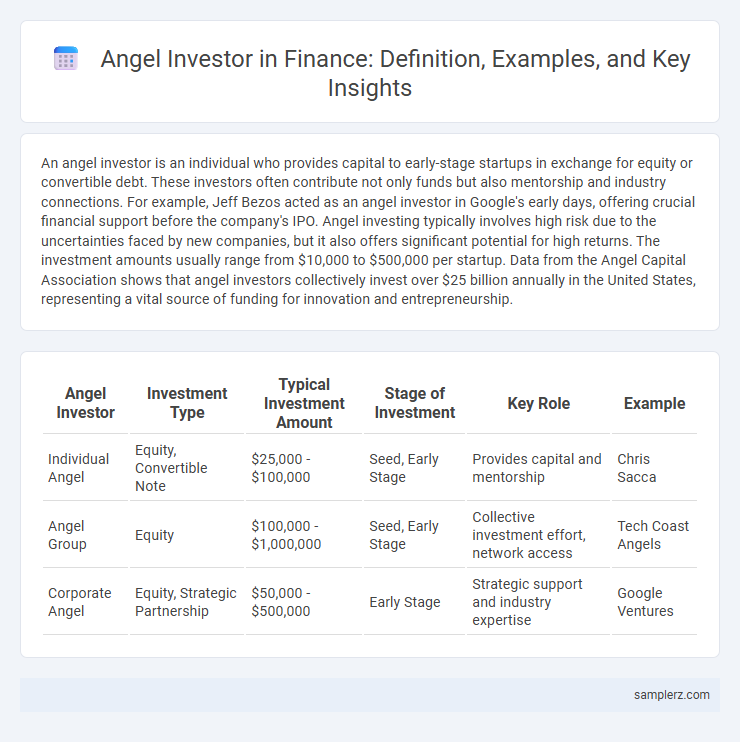An angel investor is an individual who provides capital to early-stage startups in exchange for equity or convertible debt. These investors often contribute not only funds but also mentorship and industry connections. For example, Jeff Bezos acted as an angel investor in Google's early days, offering crucial financial support before the company's IPO. Angel investing typically involves high risk due to the uncertainties faced by new companies, but it also offers significant potential for high returns. The investment amounts usually range from $10,000 to $500,000 per startup. Data from the Angel Capital Association shows that angel investors collectively invest over $25 billion annually in the United States, representing a vital source of funding for innovation and entrepreneurship.
Table of Comparison
| Angel Investor | Investment Type | Typical Investment Amount | Stage of Investment | Key Role | Example |
|---|---|---|---|---|---|
| Individual Angel | Equity, Convertible Note | $25,000 - $100,000 | Seed, Early Stage | Provides capital and mentorship | Chris Sacca |
| Angel Group | Equity | $100,000 - $1,000,000 | Seed, Early Stage | Collective investment effort, network access | Tech Coast Angels |
| Corporate Angel | Equity, Strategic Partnership | $50,000 - $500,000 | Early Stage | Strategic support and industry expertise | Google Ventures |
Understanding Angel Investing in Finance
Angel investing involves high-net-worth individuals providing early-stage capital to startups in exchange for equity, often influencing company growth significantly. Typical angel investors specialize in sectors like technology, healthcare, or fintech, contributing not just funds but strategic guidance and industry connections. This investment type bridges the gap between initial seed funding and larger venture capital rounds, mitigating risks for emerging companies.
Key Characteristics of Angel Investors
Angel investors typically provide early-stage funding to startups in exchange for equity, demonstrating a high risk tolerance and a long-term investment horizon. They often bring valuable industry expertise, mentoring, and networking opportunities to the companies they support. Their funding amounts generally range from $25,000 to $100,000, distinguished by personalized and flexible investment terms compared to institutional venture capitalists.
Notable Examples of Angel Investments
Notable examples of angel investments include Peter Thiel's early $500,000 investment in Facebook, which helped the company scale rapidly and dominate social media. Another key example is Jeff Bezos's investment in Google during its initial funding rounds, fueling its growth into a tech giant. Ron Conway's seed funding in companies like Airbnb and Pinterest also exemplifies successful angel investing that drives innovation and market disruption.
Prominent Angel Investor Profiles
Chris Sacca, founder of Lowercase Capital, is a prominent angel investor known for early investments in tech giants like Uber, Twitter, and Instagram, significantly shaping the startup ecosystem. Ron Conway, often called the "Godfather of Silicon Valley," has backed over 600 startups, including Airbnb, Google, and PayPal, demonstrating a keen eye for disruptive innovation. Esther Dyson specializes in healthcare, technology, and space startups, with early investments in companies like Flickr and 23andMe, highlighting her influence across diverse sectors.
Real-world Angel Investing Success Stories
Chris Sacca's early investments in Twitter and Uber highlight the transformative potential of angel investing, turning modest seed capital into multibillion-dollar returns. Esther Dyson's support for companies like Flickr and Meetup showcases how strategic mentoring combined with funding accelerates tech innovation. These real-world examples demonstrate angel investors' crucial role in scaling disruptive startups and shaping industry landscapes.
Sectors Attracting Angel Investors
Technology startups, especially in artificial intelligence and fintech, are primary sectors attracting angel investors due to their high growth potential and innovation. Health tech and biotechnology also garner significant angel funding, driven by advancements in medical devices and personalized medicine. Renewable energy ventures increasingly appeal to angel investors focusing on sustainable and impact-driven opportunities.
Steps in the Angel Investment Process
Angel investment begins with sourcing potential startups through networking events, pitch meetings, and online platforms to identify high-growth opportunities. Due diligence follows, involving a thorough evaluation of the startup's business model, financials, market potential, and founding team. The process concludes with negotiation of investment terms, formalizing agreements, and providing mentorship to support the startup's growth and increase the chances of a successful return.
Risks and Rewards for Angel Investors
Angel investors face considerable risks including startup failure, illiquidity, and dilution of ownership, yet they gain potential high returns by investing early in high-growth companies. Their financial support often enables innovative ventures to scale rapidly, offering substantial equity appreciation if the business succeeds. Despite the inherent uncertainty, strategic evaluation and diversification can enhance rewards while mitigating losses in angel investing.
Lessons Learned from Angel Investment Cases
Angel investing teaches the importance of thorough due diligence and understanding market potential before committing capital. Successful cases highlight the value of mentoring startups beyond funding to increase growth prospects. Many investors also learn to diversify their portfolio to mitigate high risks commonly associated with early-stage ventures.
Future Trends in Angel Investing
Angel investing is increasingly targeting disruptive technologies such as artificial intelligence, blockchain, and green energy startups, reflecting a shift towards sustainable and innovative sectors. Data from recent market analyses show a growing preference for early-stage ventures that emphasize scalability and social impact, driven by a younger generation of investors. Emerging trends also indicate the rise of syndicate investing platforms, enabling angels to pool resources and diversify risk across multiple high-potential startups.

example of angel in investing Infographic
 samplerz.com
samplerz.com